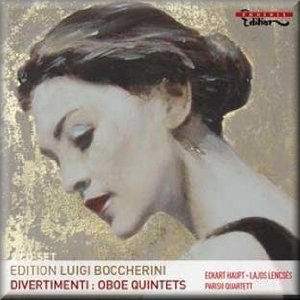 |
 |
|


alternatively
CD: MDT
AmazonUK
AmazonUS
|
Luigi BOCCHERINI
(1743-1805)
Divertimento in A, op.16 no.1, G.461 (1773) [17:01]
Divertimento in A, op.16 no.4, G.464 (1773) [16:04]
Divertimento in A, op.16 no.5, G.465 (1773) [15:20]
Divertimento in A, op.16 no.6, G.466 (1773) [16:25]
Oboe Quintettino in C, op.55 no.1, G.431 (1797) [9:21]
Oboe Quintettino in C, op.55 no.2, G.432 (1797) [9:01]
Oboe Quintettino in C, op.55 no.3, G.433 (1797) [9:41]
Oboe Quintettino in C, op.55 no.4, G.434 (1797) [11:26]
Oboe Quintettino in C, op.55 no.5, G.435 (1797) [10:20]
Oboe Quintettino in C, op.55 no.6, G.436 (1797) [11:58]
 ad hoc chamber ensemble (Eckart Haupt (flute); Mi-Kyung Lee (violin
I); Silvia Walch (violin II); Diemut Poppen (viola); Ludwig Quandt,
Götz Teutsch (cellos); Esko Laine (double bass)) (Divertimenti)
ad hoc chamber ensemble (Eckart Haupt (flute); Mi-Kyung Lee (violin
I); Silvia Walch (violin II); Diemut Poppen (viola); Ludwig Quandt,
Götz Teutsch (cellos); Esko Laine (double bass)) (Divertimenti)
Lajos Lencsés (oboe)) Parisii Quartet (quintettini)
rec. SFB Saal, Berlin, 12-14 June 1992 (Divertimenti); Süddeutscher
Rundfunk, Stuttgart, December 1992 (Quintettini). DDD
 PHOENIX EDITION PE472 [64:50 + 61:47]
PHOENIX EDITION PE472 [64:50 + 61:47]
|
|
|
As the date makes clear, these are oldish recordings, part
of a series of five double-discs reissued in striking covers
- paintings by William
Oxer - by Austrian label Phoenix. The CDs were originally
released separately in 1993 by Capriccio in time for the 250th
anniversary of Boccherini's birth. Half a dozen years
ago they emerged again, alongside numerous other Quintets and
Quartets, in the label's 10-disc boxed set commemorating
the 200th anniversary of Boccherini's death - see review.
The first disc showcases four of Boccherini's six Divertimenti.
These works were originally published as Sextets, but the chamber
ensemble set-up employed here is an alternative apparently sanctioned
by Boccherini, who further allowed that the double bass part
be omitted where desired; the flute is, however, obbligato.
These works go beyond the divertimenti of Mozart and Haydn:
they possess the same depth and spirit of imagination as Boccherini's
String Sextets (available on PE469), which were written slightly
later. Both usually have four movements, two fast and two slow,
with a third-movement minuet. The flute effectively replaces
one of the two Sextet violas and adds a higher tone colour to
the ensemble, very delicately blended, whereas the double bass
adds even greater richness to the lower registers. As in the
Sextets, Boccherini effortlessly fashions endless melodic invention
and stylish, witty virtuosity into elegant, lyrical masterpieces.
Six more musical gems can be found on CD2 in the form of the
op.55 Oboe Quintets. These were written a quarter of a century
later, but are lighter, brighter works than the Divertimenti.
All but one are in two movements only, typically a short minuet
finale preceded by a longer fast or slow movement. The oboe
may be replaced by a flute, and the set has been recorded at
least once as such (review).
Boccherini gave instructions to his publisher, Ignaz Pleyel,
to 'adjust' the oboe parts if they proved too
tricky to sell as Boccherini had written them. The autographs
were later lost, meaning that there is no way of knowing whether
these works are the altered versions.
Unfortunately, no biographical information on the sterling performers,
some of whom appeared on the excellent volume of Sextets, is
provided in the German-English booklet. Only a few of the soloists
are named on the front cover, one of which is Lajos Lencsés
who, according to the French Oboe Association, has made over
fifty recordings, the bulk of which have been on Capriccio.
Eckart Haupt, former solo flautist for the Staatskapelle Dresden,
has also made a fair few recordings in his time, again especially
for Capriccio in the Eighties and Nineties, but these days seems
to be concentrating on research. The Parisii Quartet formed
in Paris in 1984 and have since made numerous recordings, specialising
naturally in French repertoire.
Otherwise notes are fairly informative, with basic biographical
data on Boccherini identical to other volumes, and a few paragraphs
on the Divertimenti and Quintettini. Sound quality is very good,
the first CD in particular, and the editing joins that cropped
up regularly in the volume of Symphonies (PE460) are
here nowhere to be heard.
Boccherini is a composer of considerable originality who was
banished to musical purgatory on the ill-informed say-so of
early and mid-20th century critics. He deserves to be remembered
for so much more than the "celebrated minuet", and
this double-disc is a great place for anyone to start an exploration
of his magnificent oeuvre.
Byzantion
Collected reviews and contact at reviews.gramma.co.uk
|
|















